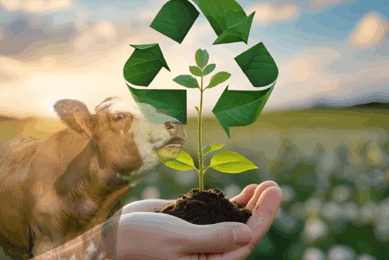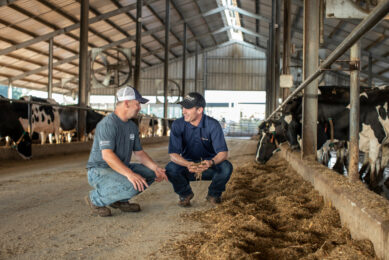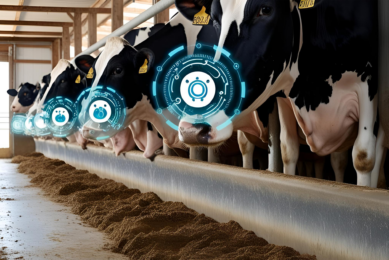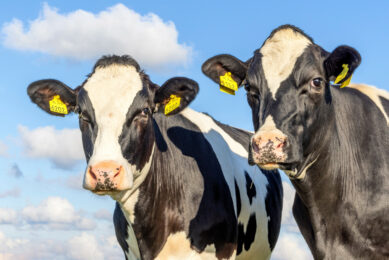New strategies to improve welfare and productivity
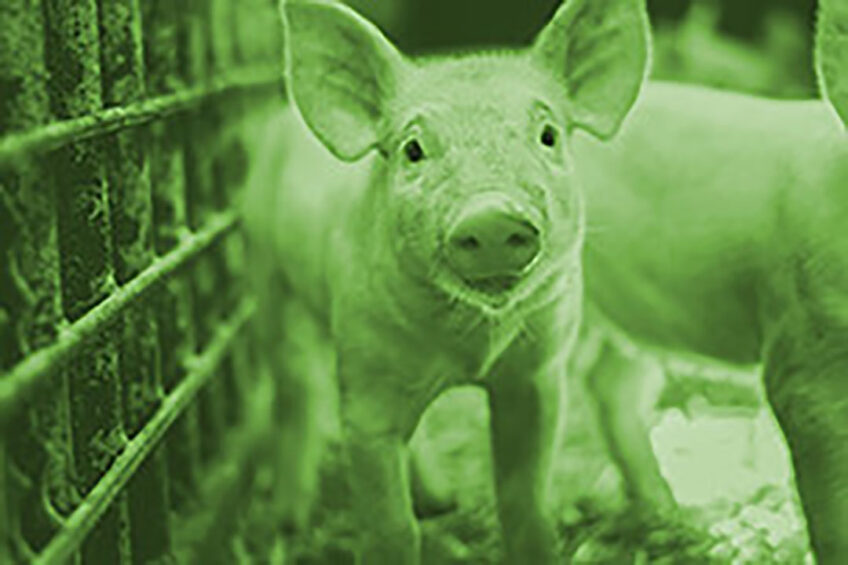
Improving welfare and reducing stress at the farm can lead to higher product quality, less losses and ultimately higher productivity. This article introduces new strategies to reduce stress while improving performance of piglets. It emphasises the interest of new concepts, as well as the benefits for animals, farmers and customers.
Nowadays, piglets are weaned and exposed to solid feed at an early age with the objective of increasing the number of litters and the productivity. However, early weaning is often associated with high stress and it may result in lower growth, intestinal disorders and other stress demonstrations.

2 of the major challenges faced by piglets at weaning are:
- the separation from the sow and
- the change from liquid to solid feeding at a time when the physiology and immune system of the young animal are still under development.
Because of the new environment and the new type of feeding, piglets experience a lot of stress and their feed intake drops dramatically. It can then not only take days for the piglets to recover, but it might as well compromise future growth, result in heterogeneous litter with a higher proportion of so-called ‘weak piglets’, and impair piglet’s health. Reduced feed intake, indeed, does not only limit the amount of nutrients that are ingested by the young piglets, but also depletes the gut of nutrients at a time when its development is key. When the gut development is impaired, the absorption of nutrients is sub-optimal and weaned piglets are more susceptible to diseases, such as diarrhoea.
Additionally, stress might have various impact on the behaviour of young piglets: it can, for instance, increase the occurrence of damaging behaviours between pen mates, like tail biting. These are typical behaviours observed after weaning, that reflect welfare problems and their consequences on farm productivity.
To sum up in a nutshell, when piglets are stressed after weaning, their feed consumption is reduced, which leads to a slower gut maturation, and therefore not only results in a delayed and heterogeneous growth but also in health challenges and welfare problems which all impact farm productivity.
Stimulating feed intake of piglets
Stimulating solid feed intake in suckling piglets is important. This early feeding seems vital for a good post-weaning performance. It is therefore critical to find strategies that initiate early feed intake, stimulate the number of piglets consuming the feed, and enhance its consumption level to create more robust piglets. Fortunately, pigs are opportunistic and omnivorous feeders and known to consume an extensive variety of food. They also likely have a high number of taste buds among mammals, only second to big ruminants (and perhaps rabbits). This creates opportunities to develop solutions that positively stimulate the appetite of piglets and help overcome the stress created around weaning.
New concepts have recently emerged to secure feed intake, reduce health challenges and improve the well-being of animals. These concepts are based on the combination of several molecules acting as sweet taste enhancers and few specific molecules naturally occurring in plant such as cinnamon or anise. Ingredients of such hybrid solutions have been carefully selected to trigger multiple modes of actions:
- The different ingredients act synergistically to create a unique and more intense taste through a multi-sensorial approach, which stimulates the curiosity of the piglets and raise interest for feed during the weaning period
- Sweet-taste enhancers act to enhance feed intake but also to support the development of the gut, which later improves the absorption of nutrients and the feed efficacy
- Finally, molecules naturally occurring in plant such as cinnamon or anise improve intestinal health and reduce inflammation
Such concepts are brought under a granulated form to ensure optimal dispersion in feed. They offer all-in-one and cost-effective solutions to overcome the challenges triggered by-post weaning stress.
Several field trials have been conducted to determine the effect of such concepts during the post-weaning period. Figure 1 shows a summary of results measured or observed during these experiments (NC: Negative Control, TC: Tested Concept).
Figure 1 – Summary of measurements and observations made during trials, from 1 to 21 days, as well from 21 to 42 days post-weaning.

As usual, many measurements and observations were made, and few important parameters were consistently improved during experiments:
- Feed intake was systematically improved, even though the amplitude of the response varies with tests
- Interestingly, the homogeneity of group was improved, due to a reduction of weak/light piglets
- Finally, the feed efficacy was improved, also for animals fed with positive control till 6 weeks post weaning
From these observations, it seems that supplementing such hybrid concepts to weaned piglets give good hope to better overcome damages from stress at weaning. Besides, expending application of these concepts to the sow may also help to further mitigate stress at weaning.
The benefits of flavour learning
During the last decade, few scientific publications have demonstrated how an early ingestion of feed could be stimulated by facilitating information transfer from sow to piglets, both through flavour learning in utero and social learning. Scientists have evaluated if young animals could learn about flavours from the maternal diet that appear in the amniotic fluid and mother’s milk, and thus reduce neophobia for similarly flavoured food types at weaning. Flavour learning could be beneficial for piglets, which after the rather abrupt weaning in pig husbandry frequently show a period of anorexia, reduced health, and stress-induced behaviours.
To validate their hypothesis, the research team set up the following experiment : Sows were offered anise-flavoured (F) or control (C) food during late gestation. Piglets were cross-fostered after birth, with each sow fostering five piglets from an F sow and five from a C sow. During lactation, sows were offered F or C food, resulting in FF, CF, FC and CC piglets. Piglets were weaned on day 25 and were given both control and flavoured food for two weeks using a double food choice approach (Figure 2).
Figure 2 – 4 treatments: animals exposed to anise both pre- and postnatally (FF), prenatally (FC), postnatally (CF), or never (CC). Adapted from Oostindjer, 2010.

This is of course not a field evaluation or ‘real-life’ but these results highlight some interesting opportunities: Scientists concluded that exposing piglets prenatally to anise flavour from the maternal diet resulted in a higher food intake in the first days after weaning, a higher growth post-weaning and a lower prevalence of stress-related behaviours and diarrhoea.
Improving wellbeing and performance
Taken together, these experiments support the fact that supplementation of such new hybrid concepts can improve welfare of the young piglets and, in the meantime, improve piglet performance. Such all-in-one concepts involve multiple modes of action that stimulate intake, reduce stress of young animals after weaning and secure long-term performance. Obviously, these concepts are stable and easy to use in feed but also compliant with the local regulatory environment, for instance regarding ingredients authorised for piglets or sow. More importantly, the observed technical benefits were converted into return of investment to support the profitability of farms, indicating that these concepts represent also sustainable alternatives for the future of pig farming.
References available on request
Author:
Dr Stephanie Ladirat, Technology Director NUQO
Join 13,000+ subscribers
Subscribe to our newsletter to stay updated about all the need-to-know content in the dairy sector, two times a week.



